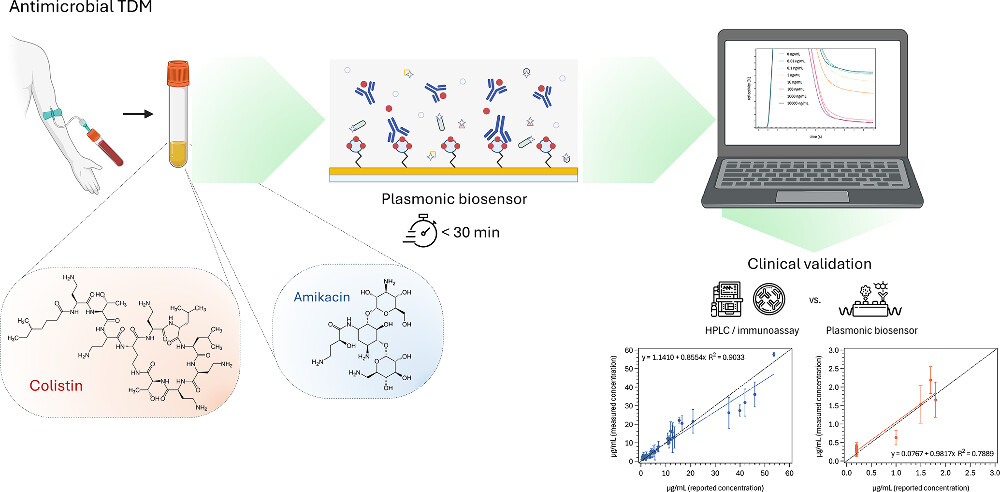Friday, 11 July 2025
New Biosensor Enables Real-Time, Precise Monitoring of Antibiotic Treatments
Researchers at ICN2 have developed innovative, portable technology that facilitates personalised tracking of antibiotic levels in a patient’s bloodstream. This tool could significantly benefit the management of infections and support global efforts to combat antibiotic-resistant bacteria.

Improper use of antibiotics, along with the absence of adequate diagnostic tools for monitoring bacterial infections, contributes significantly to the spread of multidrug-resistant bacteria, which are becoming increasingly difficult to treat. According to the WHO, this health crisis could become the next great pandemic. In 2022, antibiotic resistance caused an estimated 1.3 million deaths globally, with projections warning that this number could reach 10 million per year by 2050.
In a recent study, CSIC Prof. Laura M. Lechuga, Dr M.-Carmen Estévez, and Dr Alejandro Astúa from the ICN2 Nanobiosensors and Bioanalytical Applications Group have developed a cutting-edge biosensor capable of accurately monitoring, in real time, the levels of two antibiotics in the blood: amikacin and colistin. These antibiotics are crucial for treating infections caused by antibiotic-resistant bacteria, and their dosage must be carefully managed to maintain effective therapeutic levels in patients. The research was carried out in collaboration with clinicians from Hospital del Mar (Barcelona) and has been published in the journal Analytical Chemistry.
This developed device relies on plasmonic technology, that enables the sensitive and direct detection of small molecules—such as antibiotics—by exploiting how light interacts with metallic surfaces. Based on an immunoassay format, this technology allows for the direct quantification of antibiotic concentrations in blood serum. It requires only a few microlitres of sample and no additional reagents and delivers results within minutes.
In the study, the sensor was validated using real patient samples, demonstrating a high level of accuracy and a strong correlation with the techniques currently employed in clinical laboratories. Due to its simplicity, accuracy, and speed of results, it is an ideal candidate for use in clinical practice for bedside applications, supporting frequent monitoring.
This advancement represents a significant contribution to the therapeutic monitoring of antibiotic treatments. Its implementation in clinical practice could enable more precise dose adjustments, reducing the risk of side effects and suboptimal therapeutic outcomes. It will also represent a step forward in the fight against the emergence of multiresistant bacteria.
Reference article:
Astúa, A; Estevez, MC; Luque, S; Grau, S; Sorlí, L; Montero, M; Horcajada, JP; Lechuga, LM. Therapeutic Drug Monitoring of Amikacin and Colistin in Patients with Multidrug-Resistant Gram-Negative Infections Using a Portable Plasmonic Biosensor. Analytical Chemistry. (2025). https://pubs.acs.org/doi/10.1021/acs.analchem.4c06748.

